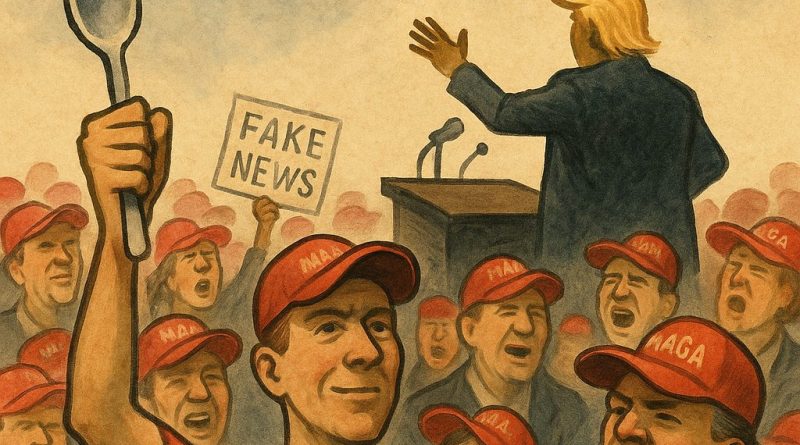Down the Hatch: How MAGA Swallowed the Unspeakable
In the waning days of summer, former President Donald Trump stood before a cheering crowd at a rally in Sarasota, Florida, his rhetorical flair undiminished by time or political turmoil. Between his familiar grievances about stolen elections and media persecution, he unleashed a curious metaphor. “They’re always saying, ‘Oh, Trump supporters, they swallow whatever Trump says.’ And you know what, folks? If I told them—I mean, it’s just incredible, unbelievable—if I said tomorrow, ‘Hey, folks, eat your own you-know-what,’ they’d be out there doing it. That’s loyalty!”
As Trump’s crowd erupted in laughter and applause, reporters quickly transcribed the latest controversial remarks from the ex-president. Within hours, the footage went viral, spawning hashtags and think-pieces with titles like “Trump Just Told His Supporters to Eat Their Own Waste,” and “How Autocoprophagia Became a Political Flashpoint.”
Predictably, Trump refused to walk back or clarify his statement. The more insistently the media highlighted the grotesque metaphor, the more defiantly silent Trump became on the matter. The ambiguity of his intention—half praise, half derision—became yet another litmus test, not of Trump’s credibility, but of his supporters’ devotion.
Initially, Trump’s ardent backers defended the remarks with dismissive irony, crafting memes and jokes to mock the media frenzy. “Can’t wait to try my new MAGA diet!” and “Own the libs by owning your digestion!” became ubiquitous online. The satire was thick, the humor dark, and for weeks it seemed that Trump’s off-the-cuff hyperbole would fade into the obscurity of political memes past.
But satire, when weaponized politically, tends to lose its ironic sheen. By late autumn, online forums devoted to Trump had begun to circulate challenges—subtle encouragements of a more literal interpretation. Videos emerged, first ironic and performative, then oddly sincere. Trump loyalists proclaimed they were “standing up to media lies,” embracing the unthinkable as a form of political defiance.
Sociologists and psychologists watched with fascinated horror as this ironic spectacle morphed into something more insidious. Dr. Laura Petrakis of Columbia University termed it the “absurdity threshold,” the point at which ironic defiance becomes genuine identification. “Initially, these acts are performative,” she explained. “But performativity is powerful—it rewrites norms. What starts as a joke can, frighteningly, become genuine political identity.”
By the end of the year, emergency rooms reported an unprecedented spike in cases linked to the practice. Doctors, at first baffled, began reluctantly acknowledging a cultural phenomenon that transcended medical advisories. Public health campaigns against autocoprophagia, inadvertently earnest, fueled the very defiance that had sparked the phenomenon.
Yet, Trump himself remained aloof, neither condemning nor explicitly endorsing the surreal trend he’d inadvertently launched. This silence fed into his supporters’ narrative: defying experts and media alarmists became synonymous with political freedom. The grotesque act itself ceased to matter. What mattered, supporters argued, was autonomy, rebellion, and allegiance.
As one Ohio supporter told an interviewer with unsettling earnestness, “It started as a joke, sure. But now? Now it’s about freedom. It’s about telling them they can’t control us.”
And so, in America’s ever-stranger political landscape, absurdity had once again become reality—a testament to the power, peril, and peculiar psychology of ironic devotion.

